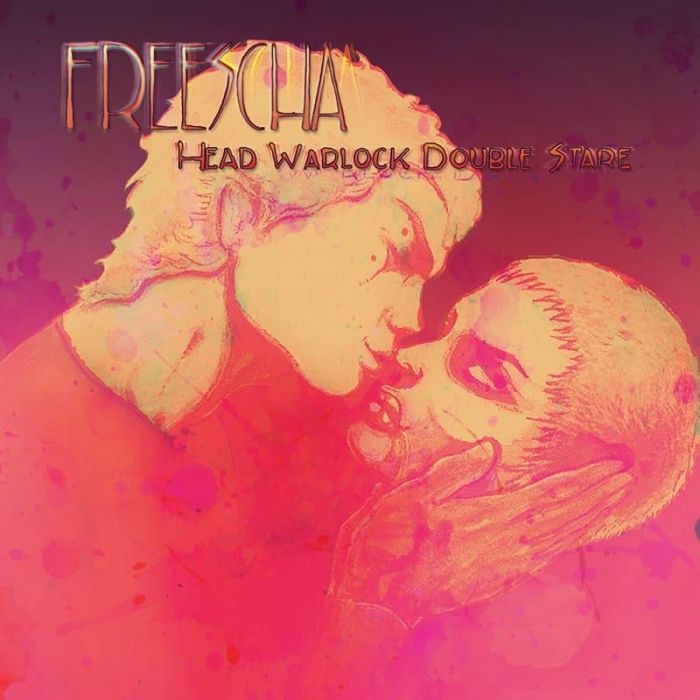Head Warlock Double Stare by Freescha (Review)

You could probably be forgiven if, after glimpsing this album’s title, thumbing through the meager artwork, and taking note of various song titles (“Galacticus,” “Phantom, Strike The Disco Down!,” “Death Battle 2: Call of the Haunted (Return Of Sawlord — Baby Tiger)”), you jumped to the conclusion that this was some sort of druggy, psych-metal endeavor. You know, the kind where the guitar riffs are thick and sludgy like resin, organs drift and noodle their way across psycho-tropic landscapes, lyrics abound with medieval warlock imagery, and the whole thing is best encountered with black lights a-blazing.
In reality, Freescha’s music is as likely a product of mind-altering substances as any psych-rock album — and could probably count as a mind-altering substance itself — though there are no atmosphere-scraping guitar riffs or organ drifts to be found. Rather, Head Warlock Double Stare delves into a broken, fractured take on analog synth music that exists somewhere between Black Moth Super Rainbow’s child-like whimsy and Boards of Canada’s eerie textures. And if there are any warlocks lurking in the lyrics, they’re smeared over with a healthy vocoder coating.
The duo’s synths sound like they’re all missing various and sundry vacuum tubes, switches, and other dusty components. As such, the tones that make up the vast majority of the album are gangly and warbling, cutting out every other second, tinted with fuzz and distortion, and sometimes take a few seconds to warm up before resembling something even vaguely melodic. But instead of being distracting or annoying, all of these imperfections actually make the sounds seem rather otherworldly, echoing from somewhere in the great beyond to our own little plane of existence — but only imperfectly.
Plenty of tiny little moments of beauty and whimsy are sprinkled throughout the album. Hypnotic melodies circle and swirl around the you on “Moving,” gracefully bending and undulating like the lights of some distant alien city playing across a constantly shifting band of clouds, while trembling little piano chimes and ghostly traces of vocoder sift through. The airy analog cascades and huffing, shuffling drum program on “Where All Good Squishes Go” suggest a slightly less playful Plone (remember them?) while “The Pageant of Smote Thine Beard” strikes up a solemn Renaissance Fair procession by way of Air (but only if Air were using an assembly of Moogs and Arps scavenged from some random back alley).
Unfortunately, the blurred, amorphous nature of the duo’s sound palette causes much of Head Warlock Double Stare’s 60 minutes to run together, becoming long stretches of grainy synth melodies and washed out slabs of analog wash that smear across the listener’s eardrums. Some of album’s best, funnest, and most haunting moments come in chunks that barely last a minute, and so often get lost in the mass when you listen to the album as a whole. But when the album is broken into chunks, when these little pieces are sought out and listened to on their own, it’s impressive how much texture and detail the duo crams into them.
“Nothing To Say But Magic” is perhaps the ultimate slice of nostalgia, a take on all of those glorious themes from ’80s sitcoms — I hope I’m not the only one who sees Tony Danza and Judith Light whenever the song plays — that dances on top of a chintzy synth-beat and ends with more ghostly vocoder bits swirling around the increasingly melancholy melody. “Frozen Stiff” plays out like a Blade Runner funeral piece, with wavering Vangelis-like synths joined by a darker undercurrent in the song’s final seconds.
But songs like “Secret Admirer” and “Bring Me the Boogie” are as frustrating as they are fascinating in their short length, giving us just mere glimpses of intriguing sonic ideas. We’re just left wondering about that melodic turn, that climax that seems to be ramping up, that clever-sounding rhythm — only to be cut off as the song begins fading out at the 23-second mark.
It’s the “barely there”-ness of Freescha’s sound in full effect. There’s the constant intrigue that the duo’s cracked, shivering sound creates, this notion that some part of the duo’s sound remains ever elusive, always just this far removed from what can be heard, only barely glimpsed through the broken synthesizer shards and fuzzy, nebulous melodies that are there — or when the album’s bleary sound suddenly pulls back and you hear something that you never quite caught before (like the trilling horns and club cheers on “Phantom, Strike The Disco Down” that I only really noticed as I was writing this sentence).
It’s frustrating and tantalizing and frustrating again, but when the duo’s sound is fully realized on such songs as “Moving” and “Where All Good Squishes Go,” it’s really quite lovely.